php smarty前后台模板路径的配置问题
Posted
tags:
篇首语:本文由小常识网(cha138.com)小编为大家整理,主要介绍了php smarty前后台模板路径的配置问题相关的知识,希望对你有一定的参考价值。
我是新手,对smarty还是不怎么熟悉,我现在想把模板文件夹分为两个,前后台的,那在配置的时候是应该怎么配置呢,
$smarty=new smarty;
$smarty->template_dir=base_path.smarty_path."templates/";
$smarty->compile_dir=base_path.smarty_path."templates_c/";
$smarty->config_dir=base_path.smarty_path."configs/";
$smarty->cache_dir=base_path.smarty_path."cache/";
//定义定界符
$smarty->left_delimiter='<';
$smarty->right_delimiter=">";
这里该怎么写?
难道一定要写两套吗?
smarty;
$smarty->template_dir=base_path.smarty_path."templates/";
$smarty->compile_dir=base_path.smarty_path."templates_c/";
$smarty->config_dir=base_path.smarty_path."configs/";
$smarty->cache_dir=base_path.smarty_path."cache/";
//定义定界符
$smarty->left_delimiter='<';
$smarty->right_delimiter=">";
$smarty2
=
new
smarty;
$smarty->template_dir=front_path.smarty_path."templates/";
$smarty->compile_dir=front_path.smarty_path."templates_c/";
$smarty->config_dir=front_path.smarty_path."configs/";
$smarty->cache_dir=front_path.smarty_path."cache/";
//定义定界符
$smarty->left_delimiter='<';
$smarty->right_delimiter=">";
不一定几套,
你想弄几套都行,你只要为你实例化的smarty对象做相应的设置就行啦。 参考技术A $smarty=new smarty;
$smarty->template_dir=base_path.smarty_path."templates/";
$smarty->compile_dir=base_path.smarty_path."templates_c/";
$smarty->config_dir=base_path.smarty_path."configs/";
$smarty->cache_dir=base_path.smarty_path."cache/";
//定义定界符
$smarty->left_delimiter='<';
$smarty->right_delimiter=">";
$smarty2 = new smarty;
$smarty->template_dir=front_path.smarty_path."templates/";
$smarty->compile_dir=front_path.smarty_path."templates_c/";
$smarty->config_dir=front_path.smarty_path."configs/";
$smarty->cache_dir=front_path.smarty_path."cache/";
//定义定界符
$smarty->left_delimiter='<';
$smarty->right_delimiter=">";
不一定几套, 你想弄几套都行,你只要为你实例化的smarty对象做相应的设置就行啦。本回答被提问者采纳
利用smarty模板(登录有关信息操作等功能)
注意:smarty模板前提是:前端和后端是分开的,所以肯定会有很多的后台页面,php页面和html页面是分开存储的!!
可以通过模板编写很多的功能,这里不是用的ajax方法写的,所以会刷新页面~~
下面就开始编写各种页面的功能了!!!
一、登录页面的编写也是分两个页面(后台和前端)
1.首先是后台的php页面,很简单只要引入“入口文件”,然后写出显示模板的方法就可以了。
<?php
include("../init.inc.php"); //引入入口文件
$smarty->display("login.html"); //要显示的登录界面
2.再就是前台的html页面,这个就是要写登录界面要显示的内容了。
<h1>登录页面</h1>
<form action="logincl.php" method="post"> <!--表单元素中的活动页面,登陆的处理页面,传输方式是post方式-->
<div>用户名:<input type="text" name="uid"/></div> <!--用户名文本框-->
<div>密 码:<input type="password" name="pwd"/></div> <!--密码文本框-->
<input type="submit" value="登录" /> <!--登录按钮-->
</form>
看下运行效果(一定要运行php页面才可以)
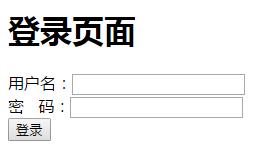
3.页面出来了,再就是表单的提交处理页面,这个是相对于前面的php页面的
<?php
include("../DBDA.class.php"); //调用出来封装好的类
$db = new DBDA(); //造新对象
$uid = $_POST["uid"]; //接收传过来的数据
$pwd = $_POST["pwd"];
$sql = "select password from user where uid=\'{$uid}\' "; //编写语句查找用户名是传过来的用户名的密码
$attr = $db->StrQuery($sql); //执行语句
if($attr==$pwd && !empty($pwd)) //判断一下
{
header("location:main.php"); //如果登陆成功就可以,就会跳到主页面
}
4.登录成功后的显示页面,我这里是显示出来的数据库中的内容
4.1后台页面的编写,其实和上一篇随笔是一样的,调出数据库并且注册变量和模板显示的方法
<?php
include("../init.inc.php"); //调出入口文件
include("../DBDA.class.php"); //调出数据库封装好的类
$db = new DBDA(); //造新对象
$sql = "select * from nation"; //查找数据库中的数据信息
$attr = $db->Query($sql); //执行语句
$smarty->assign("shuju",$attr); //注册变量信息
$smarty->display("main.html"); //模板显示
4.2前台html页面的编写,利用表的样式显示出想要显示的信息数据
<h1>主页面</h1>
<table width="50%" border="1" cellpadding="0" cellspacing="0">
<tr>
<td>代号</td> <!--表中的头信息-->
<td>名称</td>
<td>操作</td>
</tr>
<{foreach $shuju as $v}> <!--遍历php页面的数据显示-->
<tr>
<td><{$v[0]}></td> <!--代号所指的数据库信息-->
<td><{$v[1]}></td>
<td>操作</td>
</tr>
<{/foreach}>
</table>
运行结果可以看下
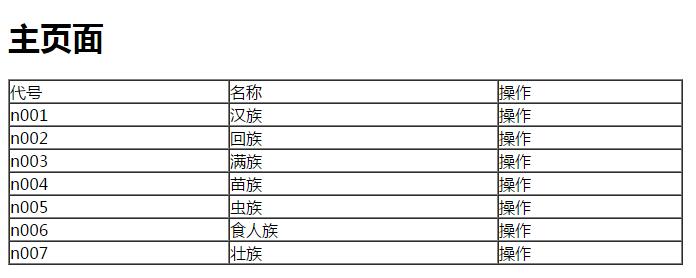
二、信息的相关操作(删除功能)
1.那么就要main的html页面中遍历信息中的“操作”就要修改成“删除”了,这里的传数据的方式就是“get”方式了,如下:
<{foreach $shuju as $v}>
<tr>
<td><{$v[0]}></td>
<td><{$v[1]}></td>
<td><a href="shanchu.php?code=<{$v[0]}>">删除</a></td>
</tr>
<{/foreach}>
那么运行出来的“操作”的那一栏就会变成了“删除”了
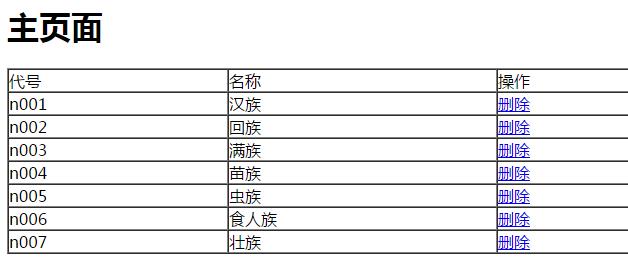
2.前台的页面解决之后,那就是删除的处理页面了,记得要和php页面放在一起
<?php
include("../DBDA.class.php"); //调用封装好的数据库类
$db = new DBDA(); //造新对象
$code = $_GET["code"]; //用get方式接收传过来的数据
$sql = "delete from nation where code=\'$code\' "; //删除代号等于传过来得代号的数据
$attr = $db->Query($sql,0); //执行语句
if($attr) //判断一下,成功刷新,不成功提示
{
header("location:main.php");
}
else
{
echo "删除失败!";
}
可以看下运行结果

单击“删除”按钮后,就会将那条信息删除
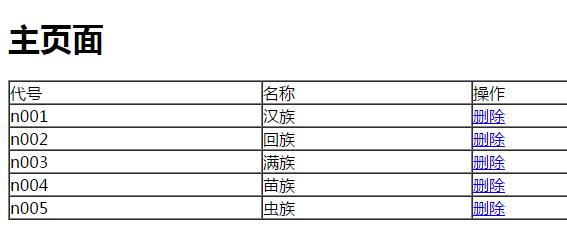
三、信息的相关操作(修改功能)
1.同样的main的html页面中遍历信息中的添加一个“修改”按钮,这里的传数据的方式同时也是“get”方式了,如下:
<{foreach $shuju as $v}>
<tr>
<td><{$v[0]}></td>
<td><{$v[1]}></td>
<td><a href="shanchu.php?code=<{$v[0]}>">删除</a>
<a href="xiugai.php?code=<{$v[0]}>">修改</a>
</td>
</tr>
<{/foreach}>
前端的页面就成了如下页面
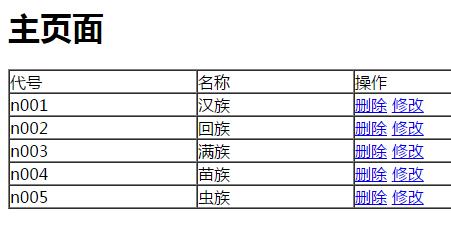
2.同样也是开始编写“修改”的页面了,这里要显示修改的原来的信息,这样就是要用到正常的显示页面,那么就是两个页面了(php页面和html页面)
2.1修改的php页面的编写
<?php
include("../init.inc.php"); //调出入口文件
include("../DBDA.class.php"); //调出数据库封装好的类
$db = new DBDA(); //造新对象
$code = $_GET["code"];
$sql = "select * from nation where code=\'$code\' "; //查询代号等于传过来代号的信息
$attr = $db->Query($sql);
$smarty->assign("nation",$attr[0]); //注册变量信息,顺便将值传过去
$smarty->display("xiugai.html"); //显示模板
2.2修改的html页面的编写
<h1>修改页面</h1>
<form action="xiugaicl.php" method="post"> <!--修改页面的处理页面-->
<input type="hidden" name="code" value="<{$nation[0]}>"/><!--默认值显示的时候就是要将传过来的值显示value,但是这里的代号是不能改的,所以要隐藏-->
<div>名称:<input type="text" name="name" value="<{$nation[1]}>"/></div> <!--同上面的结束-->
<input type="submit" value="修改" />
</form>
单击“修改”按钮后,看下运行的页面
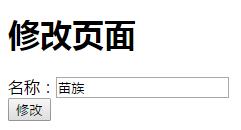
为了不想修改返回到主页面,可以在修改后面添加一个“返回”按钮
<input type="submit" value="修改" /> <a href="main.php"><input type="button" value="返回" /></a>
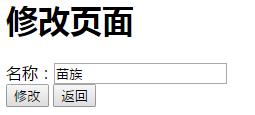
3.单击修改后,进行信息的修改,数据库也要进行修改(编写“修改”的处理页面)
<?php
include("../DBDA.class.php"); //调出数据库封装好的类
$db = new DBDA(); //造新对象
$code = $_POST["code"]; //将代号传过来接收
$name = $_POST["name"]; //同上
$sql = "update nation set name=\'{$name}\' where code=\'{$code}\'"; //修改名称当代号等于传过来的代号时
$attr = $db->Query($sql,0); //执行语句
if($attr) //判断一下语句
{
header("location:main.php"); //修改成功后返回主页面
}
else
{
echo "修改失败!";
}
运行看下整体修改过程
(1)登陆后的主页面
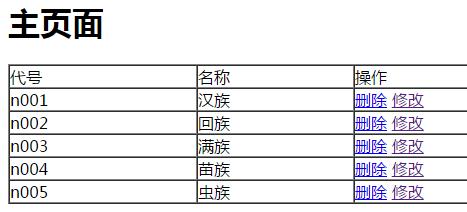
(2)单击修改按钮
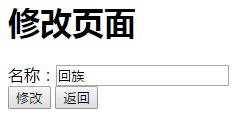
(3)修改后单击修改按钮,不修改单击返回按钮
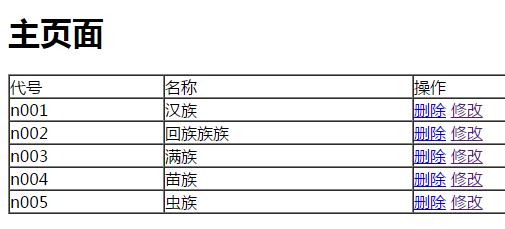
(4)数据库也跟着修改了
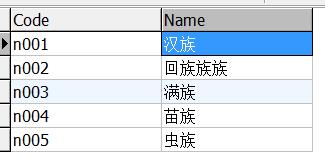
到此,基本的功能就结束了,这是用的php写的,也可以让它不刷新页面进行删除和修改功能,同样的道理。
(转)
以上是关于php smarty前后台模板路径的配置问题的主要内容,如果未能解决你的问题,请参考以下文章